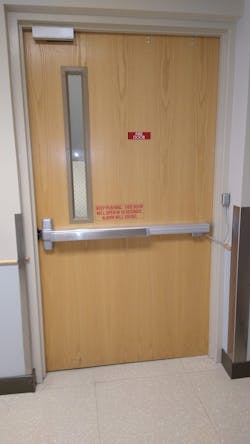Become a Fire Door Inspector
Conducting fire door inspections can be lucrative for the commercial locksmith. You probably already have the skills and simply need the certifications. Thankfully, there are a variety of programs issuing those credentials.
Annual fire door inspections were introduced with the adoption of the 2007 Edition of NFPA 80. The newest standard requires that fire-rated doors be tested for functionality no less than annually and that a written record of the inspection be kept on file for the Authority Having Jurisdiction (AHJ).
The National Fire Protection Association (NFPA) defines a qualified inspector as "an individual who, by possession of a recognized degree, certificate, professional standing, or skill, and who, by knowledge, training, and experience, has demonstrated the ability to deal with the subject matter, the work, or the project, i.e. a commercial locksmith)." The building owner (your potential customer) is responsible for maintaining and keeping fire-rated assemblies in working order.
Recent editions of NFPA 80 mandate the following information for the inspection report:
- Date of inspection
- Facility name and address
- Inspector name(s), company name, address, and signature
- Individual record of each fire door assembly inspected and tested, with unique opening identifier, location of assembly, and description
- Verification of visual inspection and functional operation
- List of deficiencies in accordance with the inspection criteria
The 13 inspection criteria currently required by NFPA 80 are:
- Labels clearly visible and legible
- No open holes or breaks in the surface of the door or frame
- Glazing, vision light frames, and glazing beads intact and securely fastened
- Door, frame, and all hardware secured, aligned, and in working order
- No missing or broken parts
- Clearance within the limits mandated by NFPA 80
- Closing device is operational and the door closes completely from the fully-open position
- Coordinator (pairs only) operates properly to close the inactive leaf before the active leaf
- Latching hardware operates properly and secures the door in the closed position
- No auxiliary hardware which interferes with proper operation of the assembly
- No field modifications have been performed that void the label
- Perimeter and meeting-stile gasketing are intact (if required)
- Signage attached to the door meets the limitations of NFPA 80 for size and attachment
These annual inspections help to ensure that the components remain functional and the door is closing and latching properly. Beginning with the 2013 edition of NFPA 80, the standard requires inspections to be performed after installation and after maintenance work, as well as annually.
Even if a particular jurisdiction is not enforcing documented inspections, it is still the responsibility of the building owner to keep fire door assemblies in proper working order, and failure to do so can result in liability if a fire occurs.
Certification Programs
Locksmiths can become a Certified Fire + Egress Door Assembly Inspector (CFDAI) through the DHI's Fire + Egress Door Assembly Inspection program. Offered through a partnership with Intertek, Telcom (TISC) and the Door Security & Safety Foundation (DSSF), two levels of courses are available.
DAI600 - Fire and Egress Door Assembly Inspection: This class will teach students how to perform and record these inspections, as well as provide tips for interacting with building owners and AHJs. It requires an intermediate level of understanding of door, frame, and hardware products and applications, and applicable code familiarity to conduct inspections. Students completing the course and passing the exam receive the certification CFDAI – Certified Fire + Egress Door Assembly Inspector.
DAI300 - Fire Door Assembly Inspection - Technician Level Course: DHI also offers a technical level course that will be taught in-house by your credentialed FDAI to train your employees to conduct in-field inspection of fire doors, under the supervision of an FDAI credentialed inspector. This course provides the technical knowledge and expertise to assist and support credentialed inspectors of swinging fire doors through all phases of the inspection process. Students completing the course and passing the exam receive a certificate of completion. Learn more about DAI300.
For more information, visit https://www.dhi.org/DHI/DHI/Education/FDAI-Program.aspx
ALOA held a two-day online Fire Door Inspection Certification Webinar in 2023, so check the ALOA calendar to see when it is offered again. This two-day online course, taught by Tom Foxwell, RL, CFDI in 2023, includes the Fire Door Inspectors Exam. This webinar includes three-hour sessions each day, plus an evening homework assignment of inspecting a fire door. To attain the certification, students must attend all six hours of the webinar and pass the AFDI Examination that is immediately following the class. Re-certification is required every three years. More info: www.aloa.org
In early 2018, new company Door Safety LLC launched its fire door inspection certification program—Door Safety Inspector (DSI).
According to the company, the DSI fire door inspection training program concentrates on teaching people how to conduct detailed visual safety inspections and functional testing of swinging egress and fire doors in accordance with fire door inspection provisions and requirements specified in NFPA 80, Standard for Fire Doors and Other Opening Protectives, NFPA 101, Life Safety Code, and NFPA 105, Standard for Smoke Door Assemblies and Other Opening Protectives. Swinging Doors with Builders Hardware, as specified in Chapter 6 of NFPA 80, are the most common types of fire doors.
Check online at www.doorsafety.com for a long list of in-person classes and webinars.
The International Fire Door Inspectors Association (IFDIA) offers several levels of classes. More info: https://ifdia.org/elearning/
In addition, the National Fire Prevention Association (NFPA) has its own NFPA Certified Fire Inspector Program. Visit https://www.nfpa.org/LearningPaths/CFI for more information.
